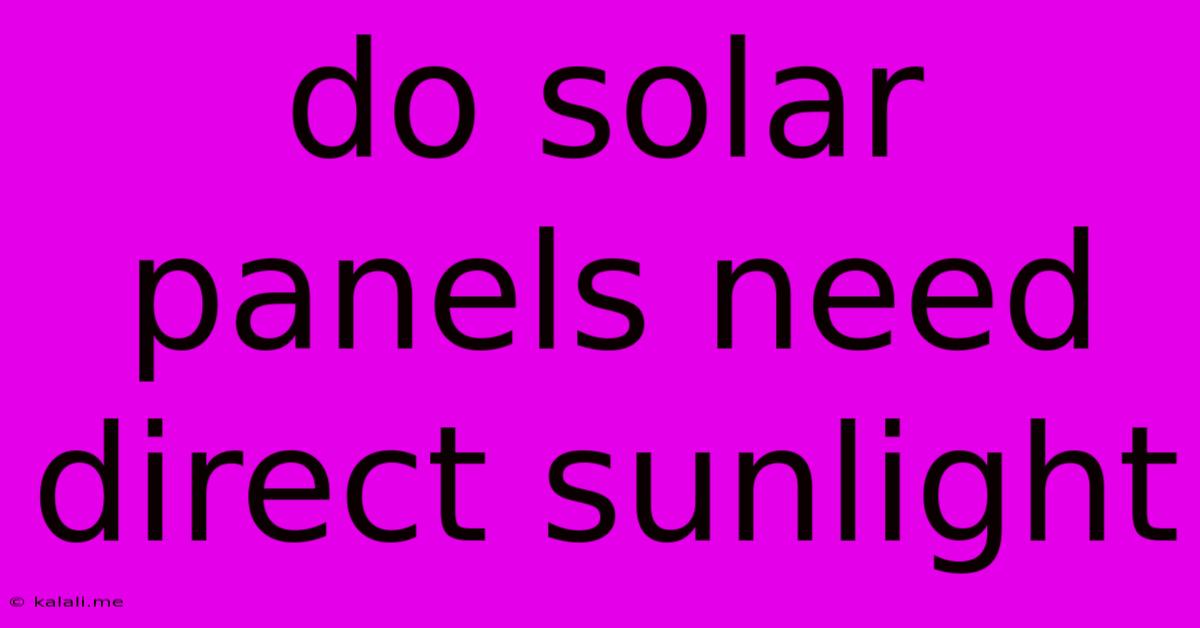Do Solar Panels Need Direct Sunlight
Kalali
May 21, 2025 · 3 min read

Table of Contents
Do Solar Panels Need Direct Sunlight to Work?
Meta Description: Discover the truth about solar panel efficiency and sunlight. Learn how much sunlight your panels actually need to generate power, and whether indirect or diffused light impacts energy production. We'll explore optimal panel placement and dispel common myths about solar energy.
Solar panels are a fantastic way to harness the power of the sun, but a common question arises: do they need direct sunlight to work? The short answer is no, but the long answer is more nuanced and involves understanding how solar panels generate electricity.
While direct sunlight is the most efficient way to power your solar panels, they can still generate electricity on cloudy days, in shade, and even during periods of diffused sunlight. Let's break down the science behind this.
How Solar Panels Generate Electricity
Solar panels, also known as photovoltaic (PV) panels, contain photovoltaic cells made of silicon. When sunlight (or any form of light within the appropriate spectrum) hits these cells, the photons in the light knock electrons loose from the silicon atoms. This flow of electrons creates an electrical current, which is then converted into usable electricity.
The key takeaway here is that it's the light itself, not necessarily direct sunlight, that drives the process. Even on a cloudy day, a significant amount of light penetrates the clouds, allowing your solar panels to generate power, although at a reduced rate.
Direct Sunlight vs. Indirect Sunlight: The Efficiency Difference
While both direct and indirect sunlight can power your solar panels, the amount of electricity generated differs considerably. Direct sunlight offers the highest energy output. On a bright, sunny day, your panels will operate at their peak efficiency.
However, even on overcast days, significant energy production is still possible. Diffuse sunlight, the soft, indirect light on a cloudy day, still contains photons that can generate electricity. While the output will be lower, it's still a valuable contribution to your energy production.
The Impact of Shade and Obstructions
Shade, on the other hand, significantly impacts your solar panel's efficiency. Even a small shadow on a single cell can reduce the overall output of the entire panel due to the interconnected nature of the cells. That's why proper panel placement, considering potential shade from trees, buildings, or other structures, is crucial for maximizing energy generation.
Optimal Placement for Maximum Efficiency
To maximize the efficiency of your solar panels, it's essential to consider the following factors:
- Sun Orientation: South-facing roofs (in the Northern Hemisphere) generally receive the most sunlight throughout the day.
- Angle of Inclination: The optimal angle of your panels should match your latitude to maximize sun exposure.
- Shade Assessment: Carefully assess potential shading from trees, buildings, or other structures. Consider using solar panel monitoring systems to identify shaded areas.
- Professional Installation: A professional solar installer can help you determine the ideal placement for your panels.
Dispelling Common Myths about Solar Panel Sunlight Requirements
- Myth: Solar panels only work in direct sunlight. Fact: While direct sunlight is optimal, they generate electricity even in indirect light.
- Myth: Cloudy days mean zero energy production. Fact: Cloudy days reduce output but still produce a significant amount of electricity.
- Myth: A small shadow doesn't affect energy production. Fact: Even a small shadow can reduce the output of an entire panel.
Conclusion
While direct sunlight provides the most efficient power generation for your solar panels, they don't require it exclusively. Indirect sunlight and even diffused light contribute to energy production. Understanding these nuances allows for informed decision-making regarding panel placement and realistic expectations of energy output, regardless of weather conditions. By optimizing your panel placement and minimizing shading, you can maximize your solar energy harvesting throughout the year.
Latest Posts
Latest Posts
-
How Fast Does Captain America Run
May 21, 2025
-
What Axis Does The Dependent Variable Go On
May 21, 2025
-
How To Strip Paint From Plaster
May 21, 2025
-
What Is A Half Of A Quarter
May 21, 2025
-
How Long Does It Take For Wheat To Grow
May 21, 2025
Related Post
Thank you for visiting our website which covers about Do Solar Panels Need Direct Sunlight . We hope the information provided has been useful to you. Feel free to contact us if you have any questions or need further assistance. See you next time and don't miss to bookmark.